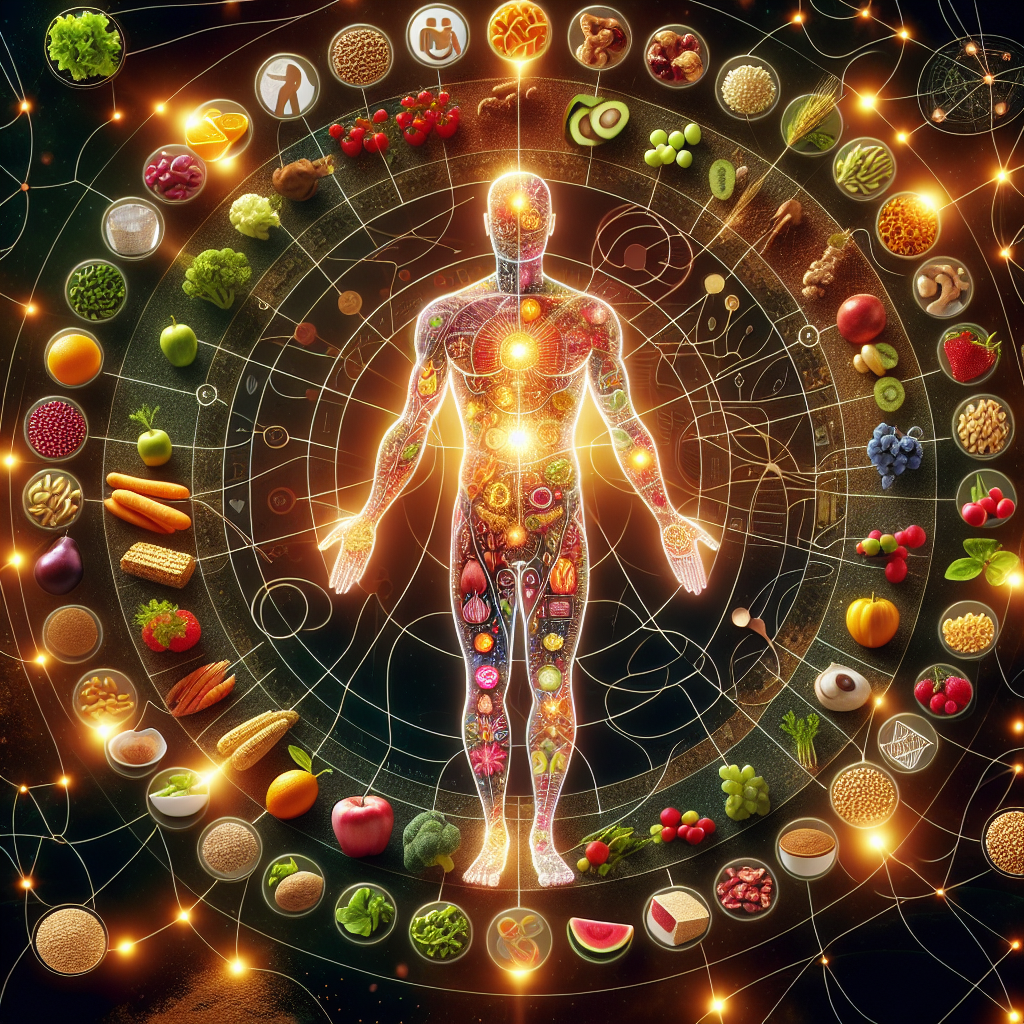Holistic Health Through Human Design and Nutrition

Discover the power of holistic health through human design and nutrition. Embrace a healthier, more vibrant lifestyle today. Start your journey here.
Exploring the Connection Between Human Design and Holistic Health
Holistic health is a comprehensive approach to wellness that considers the whole person — body, mind, spirit, and emotions — in the quest for optimal health and wellness. It is a lifestyle approach that goes beyond merely eliminating symptoms and seeks to help individuals achieve a higher level of wellbeing. One of the ways to achieve holistic health is through understanding our unique human design and aligning it with proper nutrition.
Human design is a system that combines astrology, the I Ching, Kabbalah, the Hindu-Brahman chakra model, and quantum physics to provide a unique and specific profile of a person’s genetic makeup. It offers a map or a manual that explains how you are uniquely designed to navigate the world. It helps you understand your strengths, weaknesses, and how you can make decisions that align with who you truly are.
The connection between human design and holistic health lies in the understanding that each person is unique and therefore has different health needs. Just as our human design profile is unique to us, so too are our nutritional needs. What works for one person may not work for another. This is where the concept of bio-individuality comes in. Bio-individuality is the idea that each of us has unique food and lifestyle needs. One person’s food is another person’s poison, and that’s why fad diets tend to fail in the long run.
Understanding your human design can help you make better decisions about your diet and lifestyle. For instance, some people are designed to have a strong appetite and need to eat larger quantities of food, while others are designed to eat smaller amounts. Some people are designed to thrive on a vegetarian diet, while others need more animal proteins for optimal health.
Moreover, human design can also provide insights into how you metabolize food. Some people are designed to eat slowly and mindfully, while others are designed to eat quickly. Some people are designed to eat in a calm and relaxed environment, while others can eat in a more chaotic environment without any negative effects on their digestion.
In addition to helping you understand your dietary needs, human design can also provide insights into other aspects of your health. For instance, it can help you understand your sleep patterns, your stress response, and your emotional health. By understanding these aspects of your design, you can make lifestyle changes that align with your unique needs and thus promote holistic health.
In conclusion, human design and nutrition are two key components of holistic health. By understanding your unique human design, you can make dietary and lifestyle choices that align with your unique needs and thus promote optimal health and wellbeing. It’s about understanding that you are an individual with unique needs and that there is no one-size-fits-all approach to health. It’s about making choices that honor and respect your individuality and that promote balance and harmony in your body, mind, spirit, and emotions. It’s about living in alignment with who you truly are.
Incorporating Nutrition into Your Human Design for Optimal Wellness

Holistic health is a comprehensive approach to wellness that considers the whole person, including physical, emotional, and spiritual well-being. One of the most innovative ways to achieve holistic health is through the integration of human design and nutrition. Human design is a system that combines astrology, the I Ching, Kabbalah, Hindu-Brahmin chakra model, and quantum physics to provide a unique and individualized blueprint of a person’s genetic makeup. This blueprint can guide individuals in making decisions that align with their true nature, leading to a more fulfilling and healthy life.
Incorporating nutrition into your human design is a powerful way to optimize your wellness. The foods we consume play a significant role in our overall health, affecting everything from our energy levels to our mood, cognitive function, and even our genetic expression. By understanding your human design, you can make more informed dietary choices that support your unique needs and predispositions.
To begin with, it’s important to understand that each person’s human design is unique, and therefore, their nutritional needs will also be unique. For instance, some people may thrive on a plant-based diet, while others may require more protein. Some may need to eat frequently throughout the day, while others do best with fewer, larger meals. Understanding your human design can provide insight into these individual differences, allowing you to tailor your diet to your specific needs.
Moreover, human design can also provide insight into how you best process food. For example, some people may find that they digest food best when they eat in a calm, relaxed environment, while others may need to be active or engaged in conversation. Again, understanding these nuances can help you create a dietary routine that supports your overall well-being.
In addition to guiding dietary choices, human design can also provide insight into other aspects of nutrition, such as how you respond to different types of food. For instance, some people may find that they feel energized and focused after consuming certain foods, while others may feel sluggish or foggy. By paying attention to these responses, you can further refine your diet to support your optimal health.
Furthermore, human design can also shed light on potential food sensitivities or intolerances. For example, if you consistently feel unwell after eating certain foods, this could be an indication that these foods are not in alignment with your human design. By eliminating these foods from your diet, you can potentially alleviate these symptoms and improve your overall health.
In conclusion, incorporating nutrition into your human design is a powerful tool for achieving optimal wellness. By understanding your unique genetic blueprint, you can make dietary choices that support your physical, emotional, and spiritual well-being. This holistic approach to health recognizes the interconnectedness of all aspects of our being and empowers individuals to take control of their health in a way that is in alignment with their true nature. So, whether you’re looking to improve your energy levels, enhance your cognitive function, or simply feel better in your body, consider exploring the intersection of human design and nutrition. It could be the key to unlocking your optimal health.
The Role of Human Design in Shaping a Holistic Approach to Nutrition
Holistic health is a comprehensive approach to wellness that considers the whole person, including physical, emotional, and spiritual aspects. It is a lifestyle that encourages balance, self-care, and a deep understanding of one’s unique needs. One of the most intriguing aspects of holistic health is the role of human design in shaping a holistic approach to nutrition.
Human design is a system that combines elements of astrology, the I Ching, Kabbalah, Hindu-Brahmanic system, and quantum physics to provide a unique blueprint of an individual’s genetic makeup. It offers profound insights into our personality, decision-making process, strengths, and vulnerabilities. By understanding our human design, we can make more informed choices about our diet and lifestyle, leading to improved health and well-being.
The human design system categorizes individuals into four types: Manifestors, Generators, Projectors, and Reflectors. Each type has a unique digestive profile, which can guide nutritional choices. For instance, Manifestors are often advised to eat in a calm environment to support their fast-paced energy, while Generators thrive on a varied diet to fuel their sustained vitality. Projectors, on the other hand, benefit from small, frequent meals to support their energy management, and Reflectors are encouraged to experiment with their diet to discover what suits them best.
This personalized approach to nutrition is a cornerstone of holistic health. It recognizes that there is no one-size-fits-all diet and that our nutritional needs are as unique as our fingerprints. By aligning our diet with our human design, we can support our body’s natural rhythms, enhance our energy levels, and promote optimal health.
Moreover, human design can also shed light on our emotional relationship with food. For example, emotional authority in human design indicates that an individual’s decision-making process is deeply influenced by their emotional waves. Such individuals might find themselves turning to comfort food during emotional lows or using food as a coping mechanism. By understanding this aspect of their design, they can develop healthier coping strategies and foster a more balanced relationship with food.
In addition to guiding our nutritional choices, human design can also inform our approach to physical activity. For instance, Generators and Manifesting Generators often have a lot of energy to burn and can benefit from regular, intense exercise. In contrast, Projectors and Reflectors need to be more mindful of their energy expenditure and may prefer gentle, restorative activities like yoga or walking.
In conclusion, human design offers a powerful tool for personalizing our approach to nutrition and lifestyle. It provides a roadmap to our unique genetic makeup, helping us understand our nutritional needs, emotional relationship with food, and ideal physical activities. By integrating human design into our holistic health journey, we can cultivate a lifestyle that truly nourishes us—body, mind, and spirit.
However, it’s important to remember that human design is just one piece of the puzzle. A holistic approach to health also considers other factors like medical history, environmental influences, and personal beliefs. Therefore, while human design can provide valuable insights, it should be used in conjunction with other health practices and professional medical advice.
In the pursuit of holistic health, the goal is not perfection but balance. It’s about making informed choices that support our overall well-being, honoring our uniqueness, and nurturing a deep sense of self-care. By embracing our human design, we can take a significant step towards this goal, shaping a holistic approach to nutrition that is as unique and complex as we are.